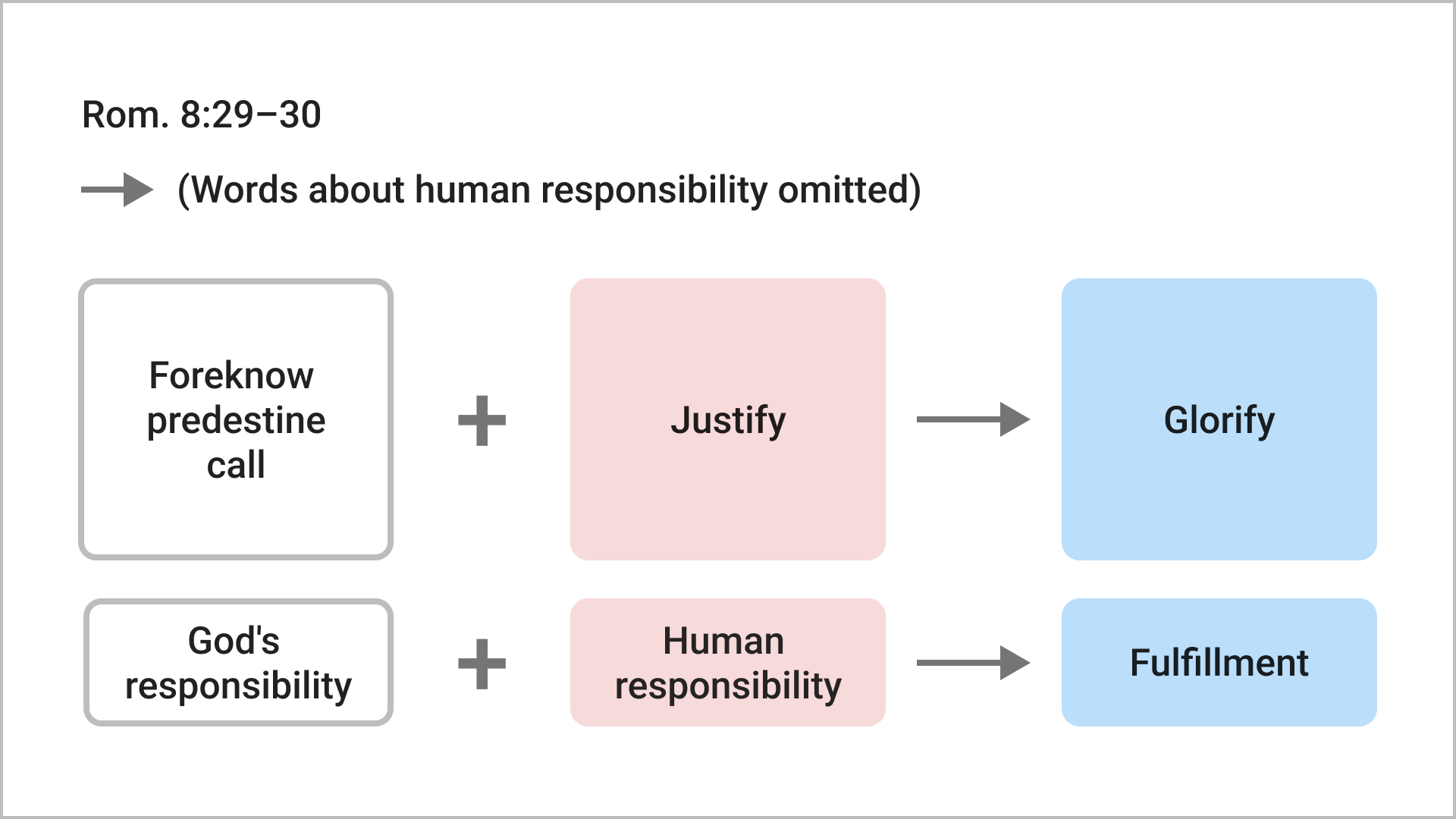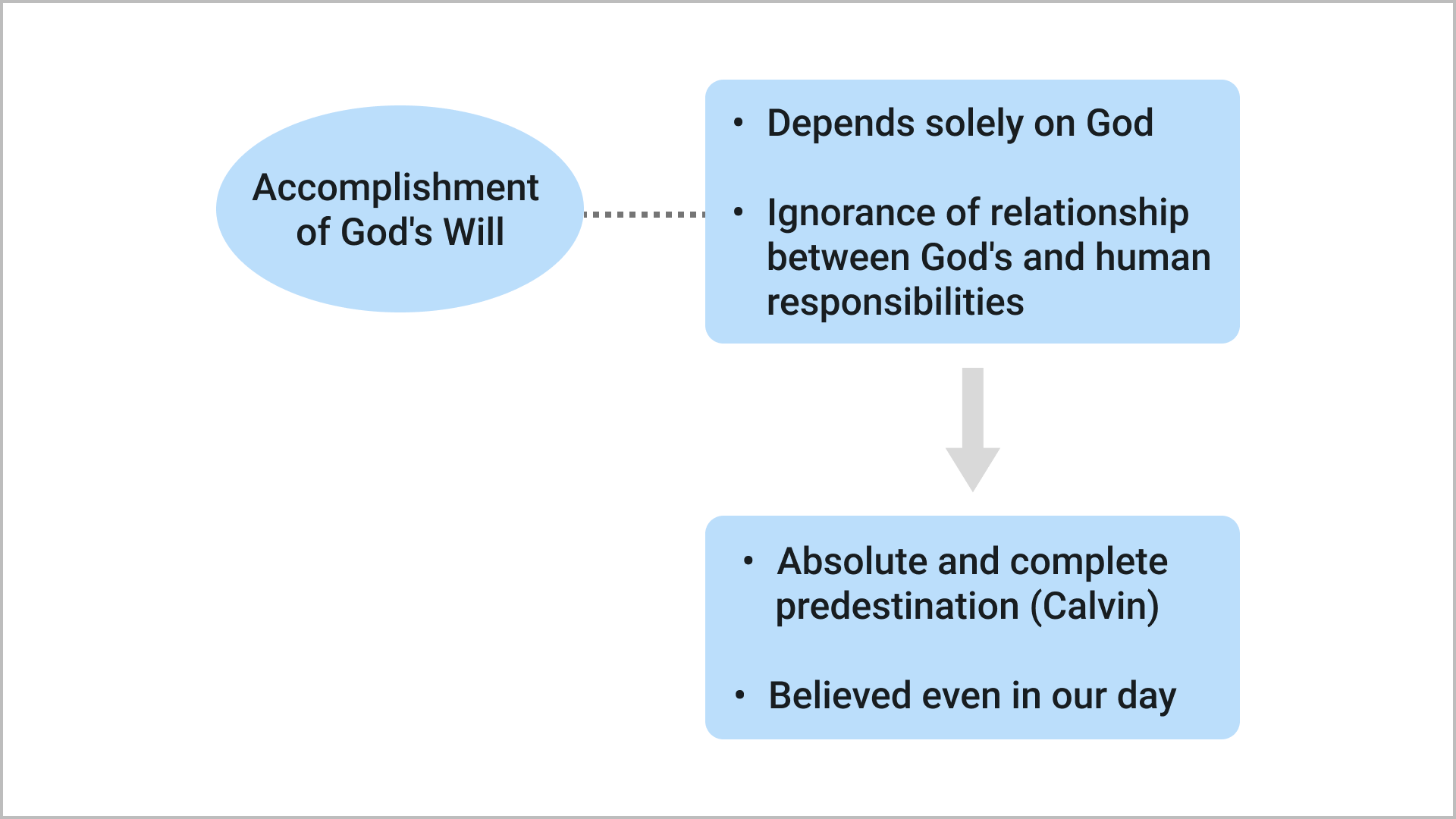Section 4. Elucidation of Biblical Verses Which Support the Doctrine of Absolute Predestination
우리는 하나님의 예정(豫定)에 관한 여러 가지의 문제점을 해명하였다. 그러나 다음으로 풀어야 할 문제는, 본장의 서언(序言)에서 열거한 성구들과 같이 모든 것이 하나님의 절대적인 예정으로만 이루어지는 것처럼 기록되어 있는 성구를 어떻게 해석해야 되는가 하는 것이다.
So far, we have analyzed the various issues concerning predestination. Next, we shall look again at those biblical verses which seem to suggest that the outcome of every undertaking is determined by God’s absolute predestination and elucidate their meaning.
먼저 로마서 8장 29절 내지 30절에 기록된 바 하나님은 미리 아신 사람을 미리 정하사, 미리 정하신 이를 또한 부르시고, 부르신 이를 또한 의롭다 하시고, 의롭다 하심을 받은 이를 또한 영화롭게 하신다고 한 말씀을 해명해 보기로 하자.
Let us begin with the following verse: For those whom He foreknew He also predestined . . . those whom He predestined He also called; and those whom He called He also justified; and those whom He justified He also glorified (Rom. 8:29-30).
하나님은 전지(全知)하시므로 어떤 사람이 복귀섭리(復歸攝理)의 중심인물이 될 수 있는 조건을(본장 제3절) 갖추고 있는가 하는 것을 아신다. 그러므로 하나님은 복귀섭리의 목적을 이루시기 위하여, 이와 같이 미리 알고 계시는 인물을 예정하시고 부르시는 것이다. 그러나 부르시는 하나님의 책임분담(責任分擔)만으로는 그가 의롭다 함을 얻어 영광을 누리는 데까지 이를 수는 없는 것이다. 그는 부름받은 입장에서 자기의 책임을 완수할 때 비로소 의롭다 함을 얻을 수 있는 것이고, 의롭다 함을 얻은 후에야 또한 하나님이 주시는 영화(榮華)를 누릴 수 있게 되는 것이다. 그러므로 하나님이 주시는 영화도 인간이 책임분담을 다함으로써만 누릴 수 있도록 예정되는 것이다. 다만 성구에는 인간책임분담(人間責任分擔)에 대한 말씀이 생략되어 있기 때문에 그것들이 오직 하나님의 절대적인 예정에서만 이루어지는 것같이 보여지고 있는 것이다.
God, being omniscient, foreknows who has the qualifications necessary to become a central figure in the providence of restoration. God predestines those whom He foreknows; then He calls upon him to fulfill the purpose of the providence. Calling the person is God’s responsibility, but that alone does not entitle the person to be justified before God and given glory. Only when the person completes his responsibility after being called by God is he justified and then glorified. God’s predestination concerning an individual’s glorification is thus contingent upon the completion of his portion of responsibility. Because the biblical verse does not mention the human portion of responsibility, people may misinterpret it to mean that all affairs are determined solely by God’s absolute predestination.

다음으로 로마서 9장 15절 내지 16절에는 이르시되 내가 긍휼히 여길 자를 긍휼히 여기고 불쌍히 여길 자를 불쌍히 여기리라 하셨으니 그런즉 원하는 자로 말미암음도 아니요 달음박질하는 자로 말미암음도 아니요 오직 긍휼히 여기시는 하나님으로 말미암음이니라는 기록이 있다.
It is written, “I will have mercy on whom I have mercy, and I will have compassion on whom I have compassion.” So it depends not upon man’s will or exertion, but upon God’s mercy (Rom. 9:15-16).
위에서 해명한 바와 같이, 복귀섭리의 목적을 이루시기 위하여 어떠한 인물이 가장 적합한가 하는 것은 하나님만이 미리 아시고 택하시는 것이다. 그러므로 이러한 인물을 택하시어 긍휼(矜恤)히 여기시거나 혹은 그를 불쌍히 보시는 것은 하나님의 특권이기 때문에, 인간이 원함으로 말미암아 되어지는 것이 아니요, 또 인간의 노력으로 달음박질을 해서 되어질 수 있는 것도 아니다. 따라서 이 성구는 어디까지나 하나님의 권능과 은총을 강조하시기 위하여 주신 말씀인 것이다.
As was explained above, only God foreknows and chooses who is most suitable to fulfill the purpose of the providence of restoration. It is God’s right to choose a person and have mercy or compassion on him; this depends not at all upon human will or human effort. This verse was written to emphasize the power and grace of God.
한편 로마서 9장 21절에는 토기장이가 진흙 한 덩이로 하나는 귀히 쓸 그릇을 하나는 천히 쓸 그릇을 만드는 권이 없느냐고 말씀하셨다.
Paul also wrote, Has the potter no right over the clay, to make out of the same lump one vessel for beauty and another for menial use? (Rom. 9:21).
하나님이 인간으로 하여금 그의 창조성(創造性)을 닮게 하심으로써 피조세계(被造世界)의 주인으로 세우시어 가장 사랑하시기 위한 조건으로서 인간책임분담(人間責任分擔)을 세우셨다는 것은 이미 논술한 바 있다. 그런데 인간은 이 조건을 스스로 범하여 타락하고 말았다. 그리하여 타락인간(墮落人間)은 마치 쓰레기와 같이 버림을 받은 존재가 되었기 때문에, 설혹 하나님이 이러한 인간을 어떻게 취급한다 하더라도 결코 불평해서는 아니 된다는 뜻을 교시(敎示)하기 위하여 이 성구를 주신 것이다.
It has been explained that God gave human beings a portion of responsibility as the condition based on which He could love them more than any other being in creation. God’s intention in giving this condition was to make them worthy to be the lords of creation by having them take after His creative nature. Yet human beingsthemselves violated this condition and fell. They have become like refuse, fit to be discarded. In such a state, fallen people have no cause to complain, no matter how God may treat them. This is what this verse teaches us.
그리고 로마서 9장 10절 내지 13절에는 하나님이 태중(胎中)에서부터 야곱은 사랑하시고 에서는 미워하시어 장자(長子) 에서가 차자(次子) 야곱을 섬기리라고 한 말씀이 있다.
It is written that God loved Jacob and hated Esau even when they were still inside their mother’s womb and had not done anything good or evil.
에서와 야곱은 복중(腹中)에 있어서 아직 선악간(善惡間) 아무런 행동의 결과도 나타낼 수 없었음에도 불구하고 하나님께서 에서를 미워하시고 야곱을 사랑하신 이유는 어디에 있었을 것인가? 이것은 복귀섭리노정(復歸攝理路程)의 프로그램을 맞추시기 위함이었던 것이다. 이에 대한 상세한 것은 후편 제1장의 ‘아브라함가정을 중심한 복귀섭리’에서 설명하겠지만, 에서와 야곱을 쌍태(雙胎)로 세우셨던 것은 그들을 각각 가인과 아벨의 입장에 갈라 세워 놓고, 아벨의 입장에 있는 야곱이 가인의 입장에 있는 에서를 굴복시킴으로써, 일찍이 아담가정에서 가인이 아벨을 죽임으로써 이루지 못하였던 장자기업(長子基業) 복귀의 ‘뜻’을 탕감복귀(蕩減復歸)하시기 위함이었던 것이다. 따라서 에서는 가인의 입장이므로 하나님의 미움을 받을 수 있는 입장에 있었던 것이요, 야곱은 아벨의 입장이므로 하나님의 사랑을 받을 수 있는 입장에 있었기 때문에 그와 같이 말씀하셨던 것이다.
God favored one and disfavored the other and told Rebecca that “the elder will serve the younger” (Rom. 9:10-13). What was the reason for this favoritism? God favored one over the other in order to set up a certain course in the providence of restoration. Although further details will be discussed below (cf. Foundation 3.2), God gave Isaac twin sons, Esau and Jacob, with the intention of having them stand in the positions of Cain and Abel. They were to make the conditions of indemnity necessary for accomplishing His Will to recover the birthright of the elder brother, which was lost when Cain killed Abel in Adam’s family. God intended to realize this Will by having Jacob (in the position of Abel) win over his elder brother Esau (in the position of Cain). Since Esau was in the position of Cain, he was “hated” by God. Since Jacob was in the position of Abel, he could receive God’s love.
그러나 하나님이 그들을 실제로 미워하시거나 사랑하시는 것은 어디까지나 그들 자신의 책임분담(責任分擔) 수행 여부에 따라서 좌우될 문제였다. 실상 에서는 야곱에게 순종굴복하였기 때문에 미움을 받을 수 있는 입장에서 야곱과 동일한 사랑의 축복(祝福)을 받는 입장으로 옮겨졌던 것이다. 그리고 아무리 사랑을 받을 수 있는 입장에 세워졌던 야곱이라 할지라도, 만일 그가 자기의 책임분담을 완수하지 못하였더라면 그는 하나님의 사랑을 받을 수 없었을 것이다.
Nevertheless, whether God would in the end favor or disfavor them depended on whether or not they completed their given portions of responsibility. In fact, because Esau obediently submitted to Jacob, he was able to rise above his previous condition of being hated by God and receive the blessing of God’s love equal to Jacob’s. Conversely, even though Jacob was initially in the position to receive God’s favor, he would have ceased to receive it had he failed in his responsibility.
이와 같이 복귀섭리(復歸攝理)의 목적을 이루는 데 있어서 하나님의 책임분담과 인간의 책임분담이 과연 어떠한 관계를 가지고 있는가 하는 것을 알지 못하고, 모든 뜻 성사를 하나님의 전담행사(專擔行事)로서만 보아 왔기 때문에 칼빈과 같이 완고(頑固)한 예정설(豫定說)을 주장하는 사람이 나오게 되었고, 또 그것이 오늘에 이르기까지 오랜 기간을 두고 그대로 인정되어 오기도 했던 것이다.
People such as John Calvin have propounded the doctrine of absolute and complete predestination, which is widely believed even in our present day. They have held to such a doctrine because they wrongly believed that the accomplishment of God’s Will depends solely on the power and work of God. They were ignorant of the true relationship between God’s portion of responsibility and the human portion of responsibility in the fulfillment of the purpose of the providence of restoration.
